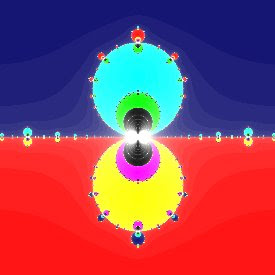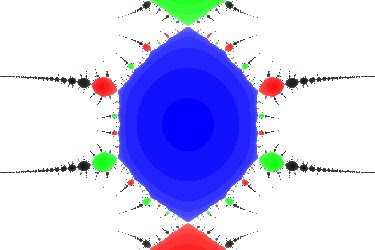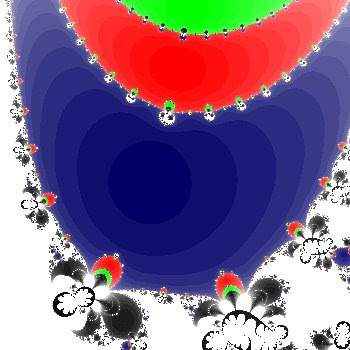[Note: This is not an original image, but the website I was crediting now appears defunct]
Last year, I explained how, exactly, axial tilt causes seasons. This year, I will explain how axial tilt changes over time in what we call the Milankovitch Cycles. The Earth's orbit and spin do not stay constant forever, but change over thousands of years. These changes are much too slow to cause seasons, but they can cause much larger climate changes like ice ages. There are three Milankovitch Cycles:
Precession
I've previously discussed the
precession of the Earth, but here is the shorter rehash. Although the Earth's axial tilt is always about 23.5 degrees offset from the orbital plane, the direction of the tilt moves around in a circle every 25,700 years. The cause of this change is the gravity of the sun and moon acting upon Earth's equatorial bulge. Got it?
To understand how this affects climate, we're going to have to understand different kinds of years. Isn't there only one kind of year, you ask? No, there are actually many, many different kinds of years with slightly different definitions and lengths. What do we mean by "year" anyway? If we mean the time it takes for the Earth to complete a full orbit, then what we want is the
sidereal year. However, that is not the kind of year that our calendar is based on! Our calendar is based on the time it takes for Earth to complete four seasons, the
tropical year. Every tropical year, there is exactly one summer solstice, when the Earth's rotation axis is tilted towards the sun. But because precession changes the direction of Earth's tilt, the summer solstice actually occurs at a slightly different location of Earth's orbit every year. The tropical year is shorter than the sidereal year by about 20 minutes.
But when we're talking about long term climate changes, we're also interested in a third type of year. The Earth's orbit is not a perfect circle, and there exists a point in the Earth's orbit when it is closest to the sun. This closest point is called the perihelion, and it occurs around January 3rd. The gravity from other planets causes the perihelion to occur at a slightly different point in Earth's orbit every year. The time it takes to get from perihelion to perihelion is called the
anomalistic year. The anomalistic year is longer than the sidereal year by about 5 minutes.
The reason precession affects climate has to do with the relative location of the summer solstice and perihelion. Currently, the summer solstice in the northern hemisphere is six months away from the perihelion. This makes for milder summers, since Earth is actually a little further away from the sun during the summer. Likewise, it makes for milder winters, since the Earth is closest to the sun during the summer. Incidentally, it also makes for
longer summers, because the Earth orbits more slowly when it is further from the sun. However, because the anomalistic year is longer than the tropical year, there is a 21,000 year cycle, in which the perihelion moves from winter to summer and then back again. Therefore, seasons will grow stronger, and then milder again every 21,000 years.
Milder seasons favor ice ages because the summer isn't strong enough to completely melt the ice left over from the previous winter. If the ice never melts, it reflects more light from the sun, cooling Earth and starting a feedback loop which ultimately leads to an ice age. Of course, we could just as easily argue that a milder winter is less likely to start the ice cycle. Ultimately, it comes down to a more quantitative analysis along with experimental observation, and the current evidence says says that when the precession cycle favors milder seasons, it favors ice ages.
Of course, in the
southern hemisphere, winter is in June, and summer is in December. When the northern hemisphere has milder seasons, the southern hemisphere has stronger seasons, and vice versa. Why would the 21,000 year cycle affect global climate if there's always one hemisphere with stronger seasons? I don't know the details, but basically, the northern hemisphere is more important (sorry South Africa!) because that's where the majority of the land mass is. Therefore, our current place in the precession cycle favors an ice age, but obviously its effect is being outweighed by something else, possibly the other Milankovitch cycles.
Obliquity
Earth's axial tilt is currently 23.5 degrees, but in fact this number changes slightly over time. Roughly every 41,000 years, the tilt cycles between 22.1 degrees and 24.5 degrees. The cause of this so called obliquity variation is, again, the sun, moon, and planets all tugging on Earth's equatorial bulge. Because axial tilt is the reason for the season, greater axial tilt will cause stronger seasons, and smaller axial tilt will cause milder seasons. Right now, we're near the middle of the cycle, and axial tilt is decreasing. Current arguments say that smaller tilt favors ice ages.
Interestingly, it has been shown that if the moon didn't exist, the Earth's axial tilt would change chaotically from 0 to 60 degrees, causing climate changes that would possibly be fatal to life. This is often used to argue that we're pretty damn lucky to have a moon. On the other hand, current theories say that a mars-sized object crashed into early Earth, and the resulting ejecta coalesced into the moon. If that collision had never occurred, the Earth would be spinning much faster now, and its axial tilt would be stable as a result.
Eccentricity
As I mentioned before, the Earth is not exactly circular. Its orbit is actually in the shape of an ellipse, with the sun placed at one focus of the ellipse. The "focus" is basically a mathematical point in an ellipse, slightly offset from the center. The ratio between the focus's distance from the center and the perihelion's distance from the center is called the eccentricity. An eccentricity near zero means a more circular orbit, and an eccentricity near one means a more elliptical orbit. Earth's eccentricity is about 0.017, meaning it is nearly a perfect circle.
For the same reasons that the perihelion changes its location in Earth's orbit over time, so eccentricity too changes over time. Because of complicated interactions with other planets, the eccentricity varies from 0 to 0.06 in not one but two cycles which last 100,000 years and 400,000 years. Our current eccentricity is a little below a maximum of the 100,000 year cycle, and will get lower over the next 30,000 years. A complicated math calculation shows that the maximum eccentricity causes up to 0.2% more sunlight than the minimum eccentricity, but that's a rather small effect. Perhaps more importantly, a higher eccentricity will amplify the effects of the precession cycle.
We would expect eccentricity to have the smallest effect of the Milankovitch cycles, but it's an unexplained observation that it in fact has the largest effect.
As an aside, we have a rather interesting way of measuring Earth's temperature over long periods of time. See, when marine plankton die, they leave their skeletons on the ocean floor. When the ocean is colder, their skeletons tend to preferentially incorporate the 18-oxygen isotope, which is basically a less common, but heavier version of the oxygen atom. Furthermore, in colder climates, 16-oxygen gets preferentially removed from the ocean and incorporated into the polar ice caps. Thus, during colder climates, the ocean floor sedimentary deposits tend to have a higher percentage of 18-oxygen isotopes. By digging into ocean sediments, we can use this to determine the Earth's temperature for the past several million years.
What the ocean sediments show is that before one million years ago, the biggest cycle in global climate had a period of about 41,000 years, suggesting that obliquity had the biggest effect. However, about a million years ago, something fundamentally changed about the Earth's climate system, and its biggest climate cycle now has a period of 100,000 years, with ice ages slightly lagging the times of low eccentricity. What changed? Why does only the 100,000 year cycle have an effect, while the effect of the 400,000 year cycle remains small? Obviously, there is still science to be done. The current best explanation seems to be that there are "complicated" interactions and feedback mechanisms which amplify the 100,000 year cycle, but obviously the devil is in the details.
So... Seasons: pretty important? Let's celebrate!
[This being a very information-heavy post, I should probably cite my main source: The Earth System, 2nd Ed. by Kump, Kasting, and Crane.
Anyways, no one should be looking to my blog as a serious research resource.]



 If you're interested in the response to the ad, Friendly Atheist has lots of links and an interview with an AHA representative.
If you're interested in the response to the ad, Friendly Atheist has lots of links and an interview with an AHA representative.